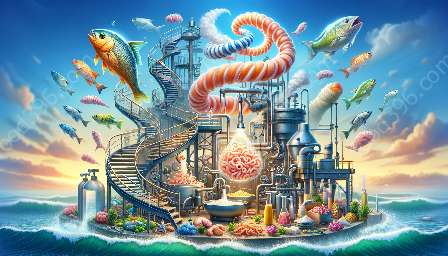Seafood waste is a prominent global issue with significant environmental and economic impacts. The valorization and sustainable management of seafood waste encompass innovative approaches and technologies to utilize by-products effectively and minimize waste. This topic cluster will explore the latest developments in seafood science, with a focus on sustainable practices and waste management in the seafood industry.
Understanding Seafood Waste
Seafood processing generates substantial waste, including discards from processing, fish offal, and trimmings. This waste, if not managed properly, can impose considerable environmental burdens by contributing to greenhouse gas emissions and resource depletion. Moreover, inefficient waste management can result in economic losses for seafood producers.
Valorization of Seafood Waste
Valorization refers to the process of extracting value from waste materials. In the context of seafood waste, valorization involves the conversion of by-products into high-value products through innovative techniques such as biorefining, enzymatic hydrolysis, and extraction of bioactive compounds. These processes not only help reduce waste but also contribute to the generation of value-added products such as fish oil, protein isolates, and bioactive peptides.
Sustainable Management Practices
Sustainable management of seafood waste encompasses a range of practices aimed at minimizing waste generation, optimizing resource use, and reducing environmental impact. This includes adopting circular economy principles, implementing efficient waste treatment systems, and developing sustainable packaging solutions to minimize plastic waste.
Seafood By-Product Utilization
The utilization of seafood by-products involves turning underutilized parts of the catch, such as heads, frames, and skins, into valuable products. This approach not only reduces waste but also enhances the overall value of the seafood catch. By converting these by-products into commercial products such as fish meal, collagen, and gelatin, the seafood industry can maximize its resource utilization while minimizing environmental impact.
Current Innovations in Seafood Waste Management
The seafood industry is witnessing a surge in innovative technologies and practices for managing seafood waste sustainably. This includes the development of biodegradable packaging materials made from seafood waste, the utilization of waste-derived biofuels for energy generation, and the implementation of efficient waste treatment processes to minimize environmental pollution.
Technology and Sustainability in Seafood Science
Advancements in seafood science are playing a crucial role in promoting sustainable practices and waste management within the industry. Cutting-edge technologies such as blockchain traceability systems, remote sensing for assessing marine pollution, and precision aquaculture are revolutionizing seafood production and waste management, leading to more sustainable and environmentally friendly practices.
Conclusion
The valorization and sustainable management of seafood waste are pivotal for the future of the seafood industry. By embracing innovative techniques, sustainable management practices, and advancements in seafood science, the industry can effectively reduce waste, optimize resource use, and create value from what was once considered waste. This not only benefits the environment but also contributes to the economic viability of seafood production and reinforces the industry's commitment to sustainability.

